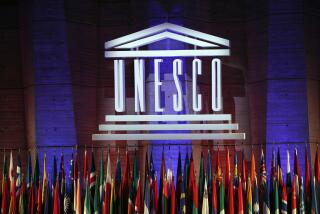11 Nations Call for Reforms : UNESCO Director Under Rising Pressure to Resign
- Share via
PARIS — Amadou-Mahtar M’Bow, the director general of the United Nations Economic, Social and Cultural Organization, is facing intense and increasing pressure to resign or, at least, reform the agency drastically.
The latest pressures come from a special meeting in Geneva of the countries that provide most of the agency’s funds and from a subtle change in the attitude of the French government toward M’Bow.
The second pressure may turn out to be more important. Many members of the UNESCO staff, nervous about their jobs since the United States withdrew from the agency at the end of last year, believe that only M’Bow’s resignation can save UNESCO and that only the French government, by turning African governments against M’Bow, can force him to quit.
Term Expires in 1987
Unless M’Bow leaves before his term expires at the end of 1987, according to this view, none of the industrialized countries will take any attempt at UNESCO reform seriously. But M’Bow, a former Senegalese minister of education, has rejected suggestions that he resign. He defiantly insists that the campaign against him and UNESCO is really a campaign against the Third World and blacks.
At the meeting in Geneva last week with a representative of the United States, officials of 11 industrialized countries, including France, set down a strategy for forcing reforms from M’Bow. These members have not been satisfied with his promises of reform and, in effect, issued an ultimatum for him to come up with serious reform by May or face a wholesale exodus from the organization.
Counting the United States, the 12 countries at the Geneva meeting contributed 70% of UNESCO’s budget last year. Although only the United States, which funded 25% of the budget, has withdrawn from the agency, Britain has formally notified M’Bow that it intends to leave at the end of this year.
On top of this, the Netherlands, West Germany, Japan and Canada have hinted that they, too, may go unless M’Bow cuts expenditures drastically, stops running the agency like a personal fiefdom and takes UNESCO out of programs that the industrialized governments regard as out of the agency’s real province. The programs most criticized are those focusing on disarmament and on the coverage and distribution of foreign news.
French Position Changing
The change in the French position has been chronicled carefully by Le Monde, France’s most influential newspaper. In the past, France has been a staunch defender both of UNESCO, one of the most prominent international organizations headquartered in Paris, and of M’Bow, a graduate of the French educational system. Only a few weeks ago, France pledged an extra $2 million to make up for a small part of the financial loss from the American withdrawal.
But, according to Le Monde’s Bernard Brigouleix, who follows UNESCO affairs closely, the French government has decided not to turn over a single penny of the pledged money until M’Bow demonstrates that he is serious about reforms.
In a series of articles, Brigouleix said that France’s hardening of attitude against M’Bow seems to date from the transfer a few weeks ago of Latin American specialist Regis Debray from the staff of President Francois Mitterrand to the Council of State, a judicial body. Debray, an associate of the late Cuban revolutionary Ernesto (Che) Guevara in the 1960s, was viewed as a defender of UNESCO.
French Lawyer Demoted
M’Bow also upset the French government, according to Brigouleix, by recently demoting a French lawyer at UNESCO for giving him unwelcome advice. The lawyer had advised M’Bow against asking the World Court to force the U.S. government to pay another year’s dues, based on a technicality. Later, when M’Bow failed to round up enough support for the lawsuit from member nations, he dropped the plan.
The change in the French attitude was first seen at the meeting in Geneva. The French joined the other governments in their decision to demand serious reforms from M’Bow.
The 11 members of UNESCO who met in Geneva were Switzerland, France, Britain, Japan, West Germany, Italy, Spain, Holland, Belgium, Australia and Canada. The United States attended the session under its new status as an official observer of UNESCO.
More to Read
Sign up for Essential California
The most important California stories and recommendations in your inbox every morning.
You may occasionally receive promotional content from the Los Angeles Times.










